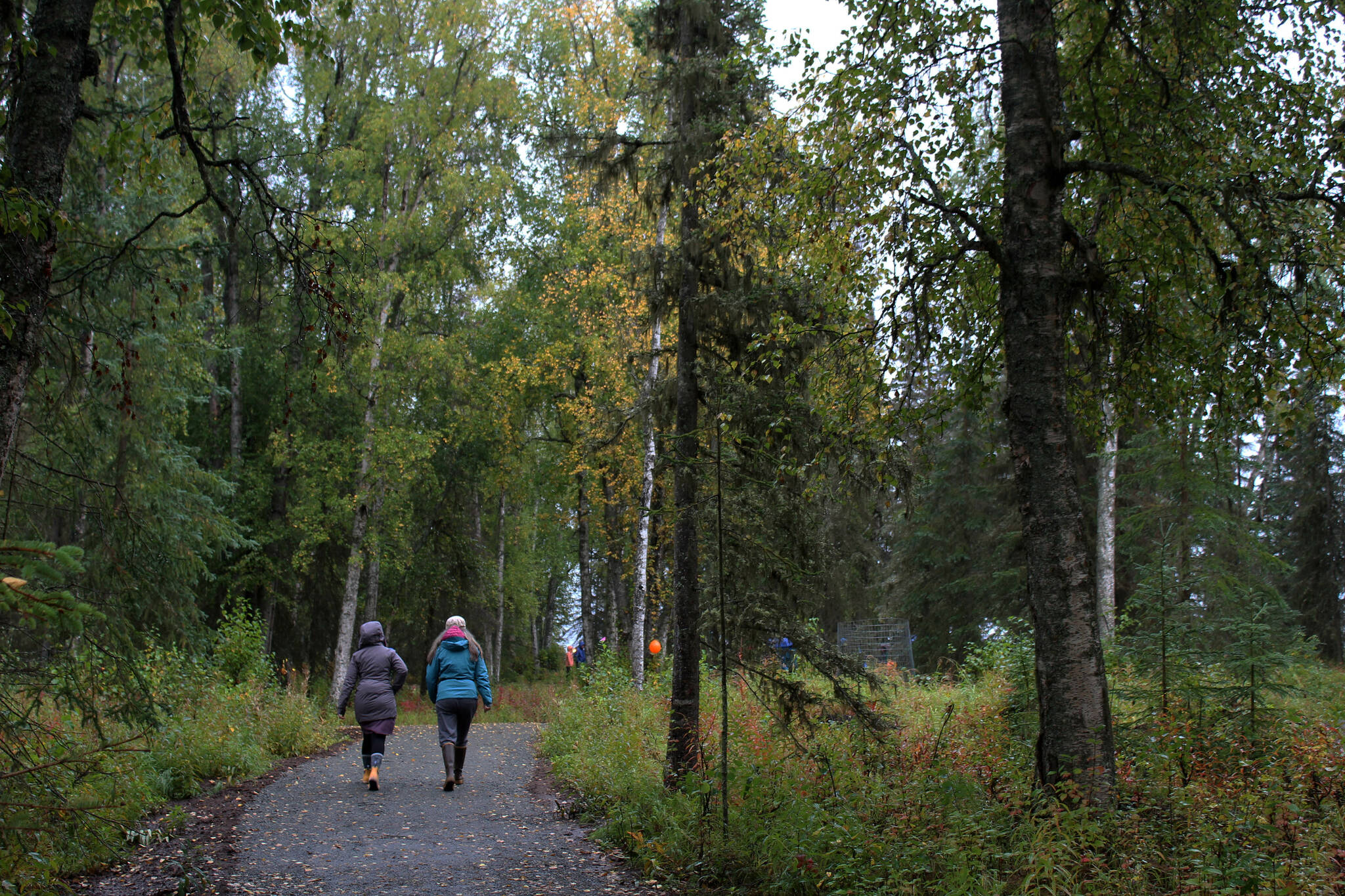An outpouring of rain and support heralded the grand opening of a new trail network in Soldotna on Thursday. The Kenai Peninsula Peace Crane Garden Trails, located on Marydale Avenue near Soldotna High School, officially unveiled its gravel pathways and Sandhill Crane statue at a public ceremony celebrating the progress made on the park.
In all, about 50 people clad in rain jackets and huddled umbrellas joined project leads, community faith leaders and local legislators to celebrate the garden trails, which have been years in the making.
The project, which has been touted as Alaska’s first Japanese public trail, has roots in gingko seeds that project leads Sarah and Matthew Pyhala received in 2018. The seeds were harvested, uncontaminated, from the 1945 atomic bombing of Hiroshima, Japan. Those seeds later sprouted saplings and inspired the garden’s purpose of restoring visitors’ physical and psychological being.
Shimai Toshi Garden Trails, Inc. — the group behind the trails project — received last year a $15,000 grant from the Rasmuson Foundation. The project is also part of a Community Trail Management Agreement with the Kenai Peninsula Borough, which owns the land on which the park sits.
Matthew Pyhala, who facilitated Thursday’s events, opened the ceremony with a poem and gave an overview of the project from its inception. He said he was challenged four and a half years ago, at a Rotary International Peace Conference, to devise a grassroots project that would promote peace and prevent nuclear conflict.
When asked what niche he thinks the trails and gardens will fill in the Soldotna community, Matthew Pyhala said it provides a space to come together over a shared appreciation for peace and for nature.
“I think everybody is united in the desire for peace in the world and so with it being a symbol of hope for the future and peace, that’s really the main emphasis,” Pyhala said.
Jon Ross, of the Salamatof Native Association, provided a land acknowledgment and spoke of how the Dena’ina and Sugpiaq people have been caretakers of the land for thousands of years. Residents are united by the fact that they live and work on traditional Dena’ina land, Ross said, which he hopes will be honored through the garden.
“Hopefully over the years, this garden can be a place where the history of our people and our stewardship of the land can be honored and recognized,” Ross said.
Artist Christina Demetro, the visionary behind the Sandhill Crane sculpture unveiled Thursday, said she first envisioned a sculpture of a bird with xylophone chimes when she was 19. The final figure, a Sandhill Crane with xylophone wings, reflects contributions from community members and students across the Kenai Peninsula, she said.
“Like sculptures, like a park that took more than four years, like world peace, some ideas take a long time,” Demetro said.
The sculpture was unveiled by Demetro and Matthew Pyhala to chants of “peace” by attendees.
Sarah Pyhala said there’s still work that needs to be done on the project site, but that “a lot of perseverance” has taken the project to where it is. The $15,000 Rasmuson Foundation grant, she said, allowed for gravel to be placed on the trail paths. Moving forward, Sarah Pyhala said they plan to focus on the planned entrance gate.
Also in attendance to help dedicate the trails were faith leaders from around the central Kenai Peninsula. Those leaders included Ross and Wanda Reams who offered a traditional Dena’i na greeting song and prayer; Paula Bute with the Briat Elohim Jewish Congregation of the Kenai Peninsula; Deacon Dave Carey; and Jodo Shinshu Buddhist Rev. Diane Jishin Dunn.
More information about the Kenai Peninsula Peace Crane Garden Trails can be found at akjapaesegarden.org.
Reach reporter Ashlyn O’Hara at ashlyn.ohara@peninsulaclarion.com.

